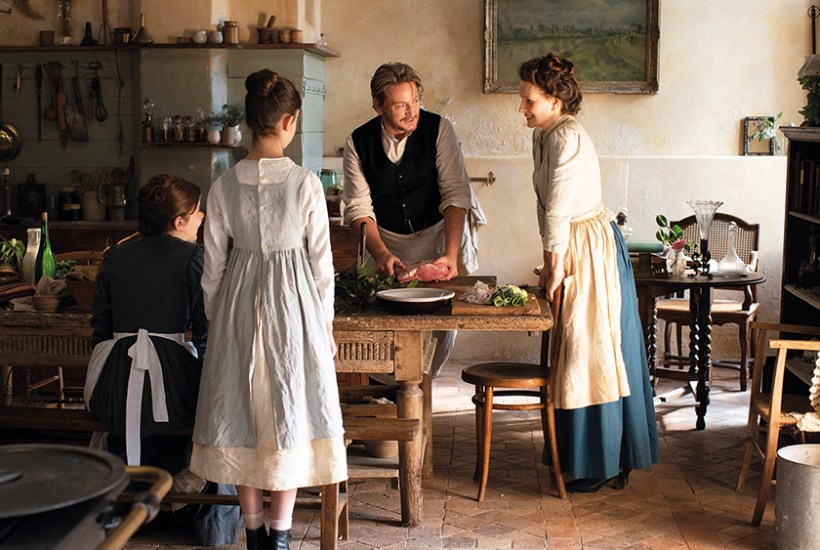The Taste of Things, which is this year’s French entry for best international film at the Oscars, is a gastro-film but it is not of the ‘Angry Male Chef’ genre. It’s not Boiling Point or The Menu or The Bear. It is not stressful or adrenaline-filled. No one swears or screams ‘Yes, chef!’ Instead, it is sensuous, languorous, soothing and as rich and deep as (I now know) a consommé should be. It will also force you to reappraise vol-au-vents which, in the right, tenderly loving hands, need not be the mean little bullety things that were served here in the seventies. (My mother, I remember, bought them frozen from Bejam. But only for special occasions.)
The film is constructed as a series of sumptuously photographed episodes
It is a film by the French-Vietnamese writer-director Tran Anh Hung (The Scent of Green Papaya) and is loosely based on Marcel Rouff’s novel, La Vie et la passion de Dodin-Bouffant, gourmet, published in 1924. It is set in the 1880s in a provincial French country house and, in particular, the kitchen, which is often flooded with a beautiful golden light. It stars Benoît Magimel as Dodin and Juliette Binoche as Eugénie. Dodin is a famous gourmet who appears wealthy enough to not have to work. Eugénie is his cook. The opening forty minutes are solely Dodin and Eugénie, along with their helper, the servant girl Violette (Galatea Bellugi), preparing a meal. From memory the dishes include: a turbot simmered in milk, lemon and thyme; an eel-like fish coiled in a copper pan (just for stock); sautéed sweetbreads; crayfish, boiled, then plunged in ice water; a loin of veal seared on the stove top (with braised lettuce); that rich, deep, clear consommé involving many complex stages; a vol-au-vent the size of your head filled with freshly-dug vegetables, a silky béchamel and topped with asparagus, as never sold by Bejam, if memory serves.
The only sounds throughout are of butter sizzling, meat hitting hot fat, Eugénie occasionally asking, ‘the vegetables please, Violette’. The meal is for Dodin and his seriously foodie friends who meet regularly to experience Eugénie’s cooking. She has been his cook for 20 years and also his lover. It is not a secret. Everyone knows and everyone approves. He steals into her room at night and has asked her to marry him several times and thus far she has always refused. (Magimel and Binoche, by the way, were once a couple and have a daughter together.)
The film breaks the rules of storytelling. There are no conflicts, or fights, or particular obstacles to overcome and every character is kind. There is a Chekhov’s gun, which makes an appearance early on, and there will be grief, and loss and a reminder that nothing lasts forever, but otherwise this is constructed as a series of sumptuously photographed episodes. The Prince of Eurasia, whomever that might be, invites Dodin for dinner to show off. (The menu goes on for ever.) Dodin and Eugénie walk through a meadow discussing their favourite seasons. Violette brings her young niece, Pauline (Bonnie Chagneau-Ravoire), to work who, it is discovered, has precocious culinary abilities. When she is able to identify ingredients purely from the taste of a dish, Dodin and Eugénie’s faces light up in a delighted wonder.
If the film is about anything, it’s about pleasure: how to give it, how to receive it, how love can be communicated through the deep passions you might have. Cinema rarely portrays harmonious lives as it would be dull, but this is never dull. I accept that if you don’t read recipe books as if they were novels, as I do – Nigella Lawson and Nigel Slater are the best for this – you may find it narratively underpowered. But you will still learn something. I learned that the best way to eat an omelette is with a spoon. I will now never eat one any other way.
Got something to add? Join the discussion and comment below.
Get 10 issues for just $10
Subscribe to The Spectator Australia today for the next 10 magazine issues, plus full online access, for just $10.
You might disagree with half of it, but you’ll enjoy reading all of it. Try your first month for free, then just $2 a week for the remainder of your first year.








Comments
Don't miss out
Join the conversation with other Spectator Australia readers. Subscribe to leave a comment.
SUBSCRIBEAlready a subscriber? Log in